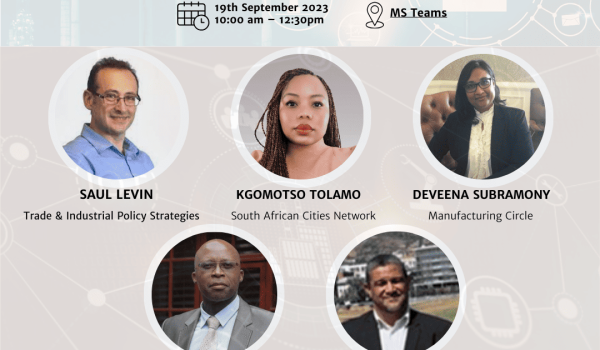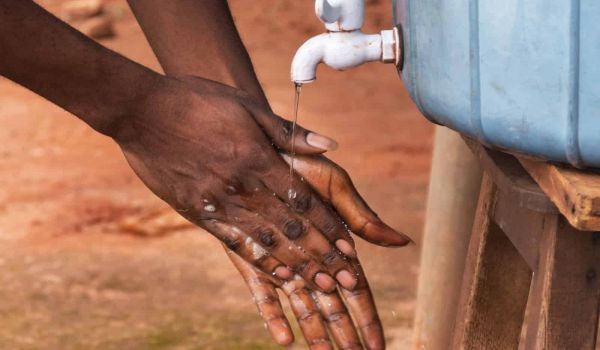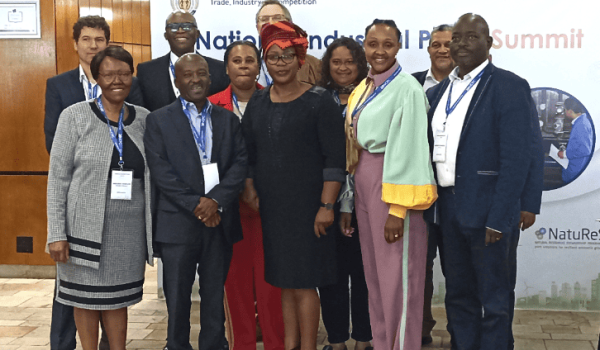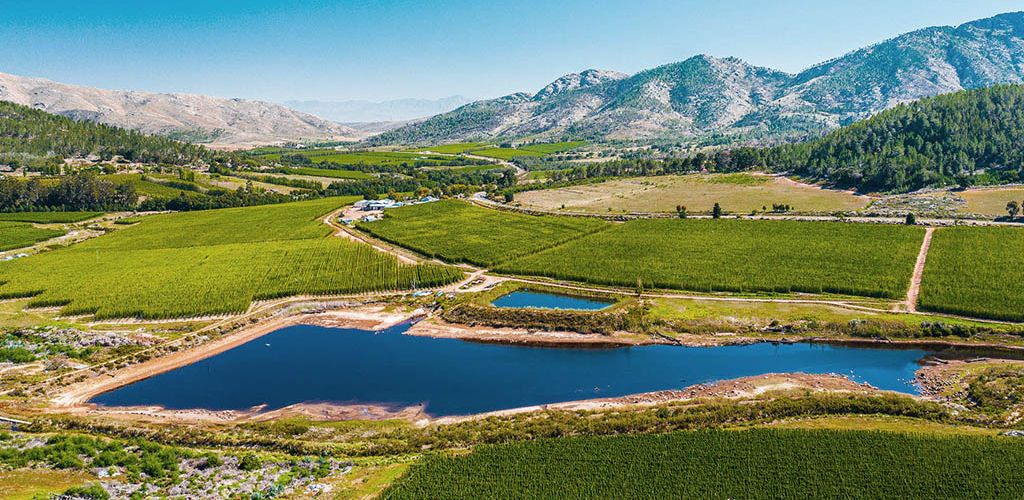
South Africa – Economic Growth Powered by its Diverse Natural Resources
South Africa is one of the three most biodiverse countries in the world. It also constitutes the second largest economy in Africa, thanks to the wealth and diversity of its natural capital and water resources. Human development has, however, put severe strain on the environment and the functioning of its eco-systems. The quantity and quality of its natural resources, especially water, is becoming a priority concern. A concerted effort across all sectors is required to safeguard environmental integrity and resilience. This also aligns with the South African National Development Plan 2030 (NDP), which identifies the building of environmental sustainability and water resilience as a national imperative for economic growth.
Partnerships in South Africa
Nelson Mandela Bay Water and Economic Resilience Partnership (NMBSP)
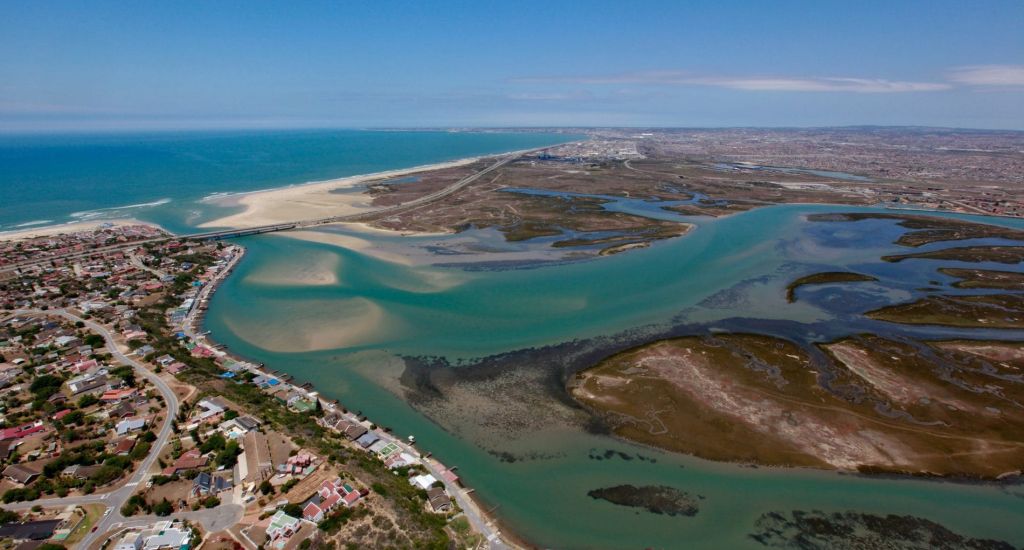
The Nelson Mandela Bay Metropolitan Municipality is the economic centre of the Eastern Cape. © Nelson Mandela Bay Business Chamber
Location: Eastern Cape
Aim: Support economic development in the Nelson Mandela Bay region through promoting natural resources stewardship and addressing water security challenges
Background: The Nelson Mandela Bay City Region in the Eastern Cape of South Africa is the hub of the automotive industry in Africa with a vibrant tourism and export agriculture sector. Yet, the region is embattled by an ongoing drought and is confronted with deficiencies in water supply and sanitation infrastructure with considerably high non-revenue water levels and water use inefficiencies. Furthermore, the ecological integrity of freshwater ecosystems such as wetlands is degraded, and weather extremes have become more severe due to climate change. The consequence of this is exacerbated water insecurity, which poses a threat to economic growth and job security across the region.
NatuReS working areas: Cities, Catchments
Activities:
1.) Mobilise government, business, civil society and academic institutions towards sustainable economic development and resilience
2.) Safeguard natural capital and natural resource value chains that form the basis for inclusive growth and resilience
3.) Create an enabling environment to stimulate inclusive green economic growth and investment
- Supported NMBBC in the establishment of a riverine management project around the Baakens River Valley, aimed at rehabilitating biodiversity, protecting the environment, supporting tourism and creating jobs
- Evaluated and promoted the most effective measures to improve economic and social development by addressing water security challenges, based on two economic studies, as evidence for targeted policies, restoration and catchment management activities
4.) Stimulate and connect township and smalltown economies to mainstream opportunities
5.) Become a leading co-lab for learning exchange on green economy and stewardship
Partners:
Private Sector: Nelson Mandela Bay Business Chamber (NMBBC), Santam
Public Sector: Department of Cooperative Governance and Traditional Affairs (COGTA), Department of Water and Sanitation (DWS), Mandela Bay Development Agency (MBDA)
Civil Society: Living Lands
uMhlathuze Water Stewardship Partnership (UWASP)
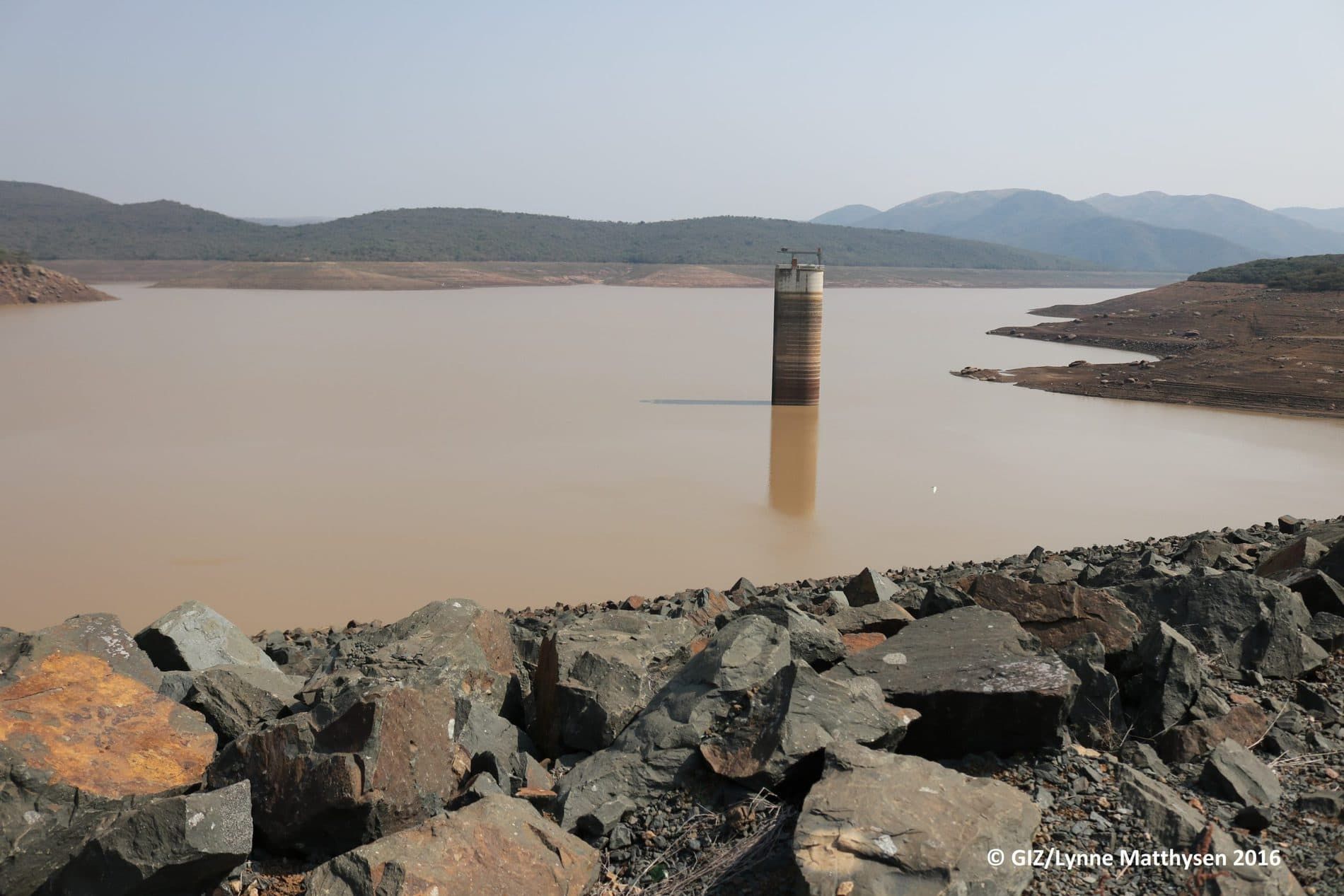
The Goedetrouw Dam in the uMhlathuze catchment. Copyright: GIZ/Lynne Matthysen
Location: Richardsbay, KwaZulu-Natal
Aim: Improved management of water resources across industry, agriculture and communities
Background: The uMhlathuze River catchment area in KwaZulu-Natal encompasses the city of Richards Bay, extensive irrigated agriculture, forest plantations, industrial complexes and various mining operations. The area relies heavily on the availability of water: Industry underpins the local economy and agriculture is a significant employer of communities in the area.
Activities
1.) Improved management of the freshwater costal lakes and surface water dam that provides for uMhathuze’s needs
- Non-Revenue Water support, using drone technology
- Improve collective dam management, harnessing expert knowledge and using a digital platform
- Support better water management by the development of a flow tracker mobile app tool for the region
2.) Strengthening of water management and waste management capacities for civil society and the private sector
- Citizen and youth-based water and waste management
- Business and natural resource management training for small-scale farmers
- Local Good Agricultural Practices (GAP) accreditation for small-scale farmers
- Information campaign on responsible citizenship including the protection of water as a natural resource
3.) Strengthening Cooperation with the Siyazisiza Trust
- Promoting extended access to value chains for smallholder farmers
- NatuReS supports the Siyazisiza Trust with the training and mentoring of smallholder farmers in Good Agricultural Practice (GAP). Covering the efficient use of resources, the trainings prepare them for an annual local GAP assessment. Passing this assessment enables smallholder farmers to access formal markets and supply their fresh produce.
NatuReS working areas: Cities, Catchments
Partners:
Private Sector: Tongaat Hulett South Africa, Mondi, South 32
Public Sector: City of uMhlathuze
Civil Society: WWF South Africa, National Business Initiative (NBI), Siyazisiza Community Trust
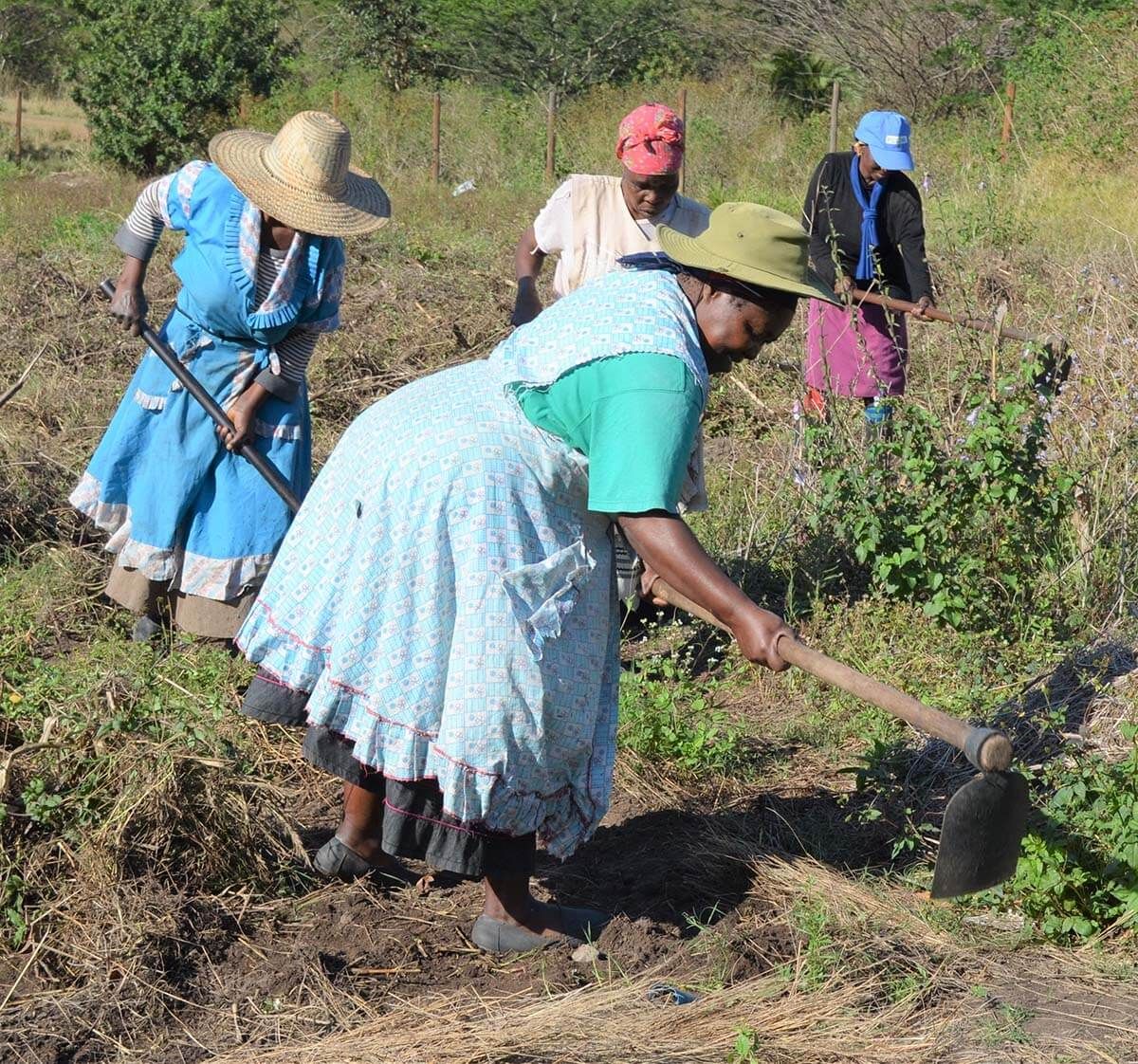
Members of the Sivukile cooperative preparing the land
Copyright: Siyazisiza Trust
A Natural Resources Stewardship Partnership for Resilient Economic Zones and Industrial Parks
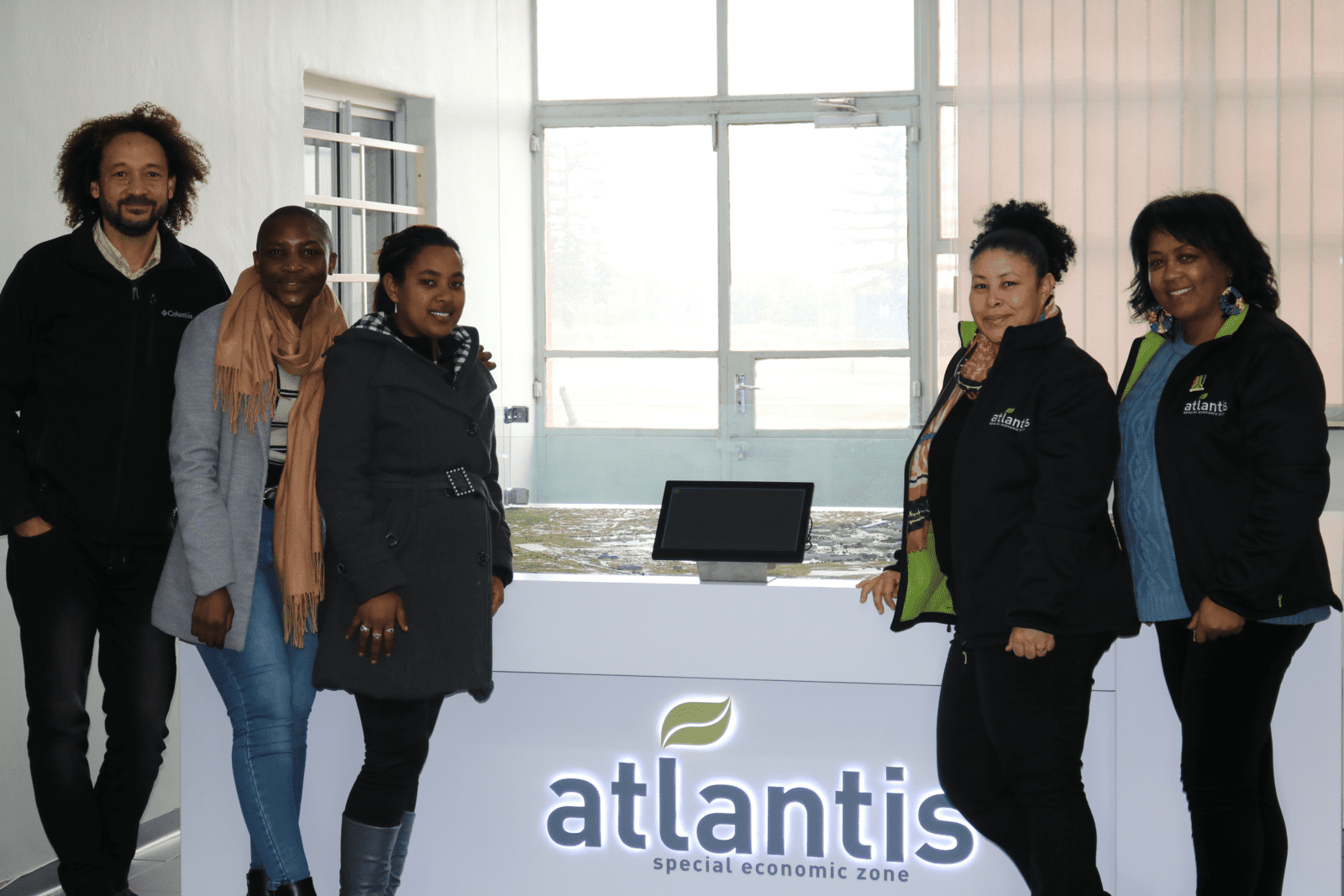
Aim: Support the mainstreaming of water stewardship and embedding of resource use efficiency practices in industrial parks together with the Department of Trade, Industry and Competition to enhance sustainable industrialization.
Background: South Africa is a water scarce country. As a result, it is important for the country’s industrial parks to optimize their water use and embrace resource efficiency methods. This is critical to reduce the pressure industrial operations have on water resources and to ensure business continuation, as well as to support efforts towards meeting the UN Sustainable Development Goals and to address challenges arising from climate change. Additionally, industrial parks in South Africa are evolving towards a clear awareness for the interdependencies between their operations and the natural environment. More parks are recognizing that their commercial viability and global competitiveness are linked to their ability to manage risks (internal and external) and mainstream sustainability practices. Water stewardship, water reuse, net zero water and other practices are pivotal to support industrial parks in their response to increasing water risks.
Activities:
1.) Nationally:
- Develop practical guidance instruments anchored in water stewardship principles
- Enhancing national awareness and expertise on water stewardship for sustainable water management in industrial parks through trainings and virtual knowledge exchanges
- Support the Department of Trade, Industry and Competition efforts in strengthening the capabilities of industrial parks and SEZs towards industrial resilience, minimising disruptions as a result of Covid-19 or unprecedented disasters.
2.) At site level:
- In cooperation with Sustainable Economic Zones they developed case studies for national learning on water resource use efficiency through the lens of water stewardship
- Provide technical support to Atlantis SEZ with the development of their Net Zero Water Implementation Plan
- Development of national Standard Operating Procedures (SOPs) on Water Stewardship for the sustainable management and use of water in industrial parks. The SOPs are part of support tools deepening learning and guiding implementation processes in industrial parks.
3.) Supporting sector wide engagement:
- Contributing to awareness raising and knowledge exchanges as well as conducting capacity building opportunities on water stewardship
- Provision of trainings and capacity building opportunities about sustainable water management practices
Partners:
Private Sector: Atlantis SEZ
Public Sector: Department of Trade, Industry and Competition (dtic)
Strategic Collaborations
Strategic Water Partners Network (SWPN)
A public-private platform for strategic water use in South Africa
Aim: Collaborating to promote natural resources stewardship initiatives which enhance sustainable water management, address shared risks in water value chains and improve conditions for resilient industrial parks and SEZs.
Background: Water Stewardship is becoming increasingly important for water sector actors across South Africa. The private sector has showcased various innovative water stewardship approaches through which water management solutions have been implemented both within and beyond the factory fence.
Resilient Economic Zones and Industrial Parks: Support embedding of water stewardship and resource use efficiency in industrial parks together with the Department of Trade and Industry and Innovation.
Water Resilient Cities Initiative
A learning collaboration together with South African Local Government Association, South African Cities Network, USAID WASH-FIN, 2030World Resources Group and selected cities in South Africa
Read an article about the latest event here.
Partner Voices
“Through the Natural Resources Stewardship Programme GIZ is partnering with various South African companies and collective initiatives to tackle the most pressing of societal challenges. Both SASOL and the Strategic Water Partners Network continues to benefit from this cooperation aimed to catalyse much-needed change. Our collective objective is to advance stewardship practices over things we don’t own but over which we collectively care a lot about. We sincerely thank GIZ and the NatuReS programme for this continued support.”
Martin Ginster – Sasol, former private sector co-chair Strategic Water Partners Network
“The Nelson Mandela Bay Business Chamber in South Africa is delighted to partner with GIZ’s NatuReS Programme. Through the Nelson Mandela Bay Stewardship Initiative a number of high-impact innovative solutions have been implemented. These include a contribution towards safeguarding water security, investments and livelihoods. We appreciate the role played by GIZ NatuReS in our region in catalysing economic development, including the green economy. We have also gained a number of critical stakeholders through this very partnership.”
Nomkhita Mona – Former Chief Executive Office of the Nelson Mandela Bay Business Chamber
